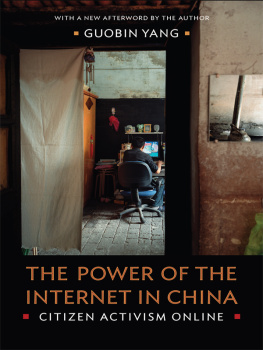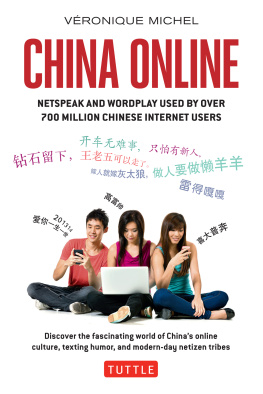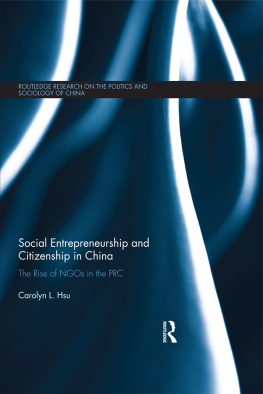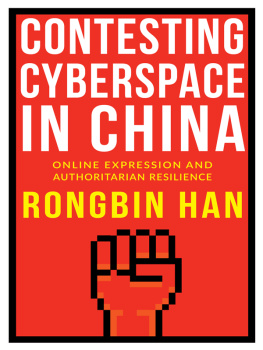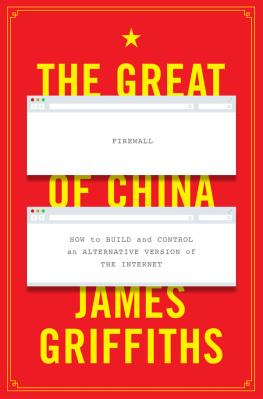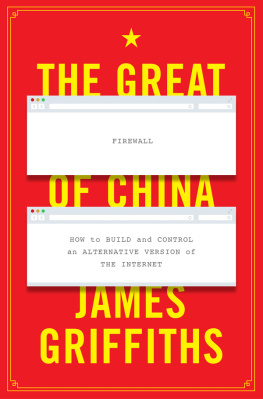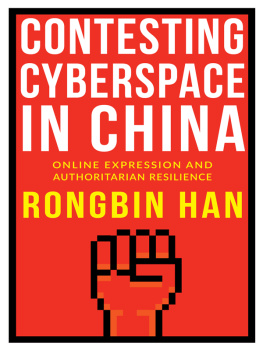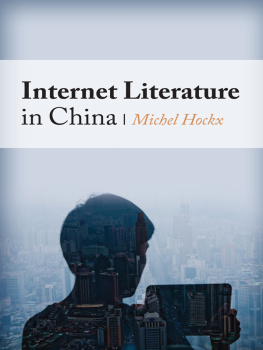THE POWER OF THE INTERNET IN CHINA
CONTEMPORARY ASIA IN THE WORLD
CONTEMPORARY ASIA IN THE WORLD
David C. Kang and Victor D. Cha, Editors
This series aims to address a gap in the public-policy and scholarly discussion of Asia. It seeks to promote books and studies that are on the cutting edge of their respective disciplines or in the promotion of multidisciplinary or interdisciplinary research but that are also accessible to a wider readership. The editors seek to showcase the best scholarly and public-policy arguments on Asia from any field, including politics, history, economics, and cultural studies.
Beyond the Final Score: The Politics of Sport in Asia, Victor D. Cha, 2008
GUOBIN YANG
THE POWER OF THE INTERNET IN CHINA
CITIZEN ACTIVISM ONLINE
COLUMBIA UNIVERSITY PRESS NEW YORK

Columbia University Press
Publishers Since 1893
New York Chichester, West Sussex
cup.columbia.edu
Copyright 2009 Columbia University Press
Paperback edition, 2011
All rights reserved
E-ISBN 978-0-231-51314-2
Library of Congress Cataloging-in-Publication Data
Yang, Guobin.
The power of the internet in China : citizen activism online / Guobin Yang.
p. cm. (Contemporary Asia in the world)
Includes bibliographical references and index.
ISBN 978-0-231-14420-9 (cloth : alk. paper) ISBN 978-0-231-14421-6 (pbk. : alk. paper) ISBN 978-0-231-51314-2 (e-book)
1. Political participationTechnological innovationsChina.
2. InternetPolitical aspectsChina.
3. InternetSocial aspectsChina. 4. InternetChina.
I. Title. II. Series.
JQ1516.Y35 2009
303.48330951dc22 2008049149
A Columbia University Press E-book.
CUP would be pleased to hear about your reading experience with this e-book at .
References to Internet Web sites (URLs) were accurate at the time of writing. Neither the author nor Columbia University Press is responsible for URLs that may have expired or changed since the manuscript was prepared.
For Lan and Yufeng

CONTENTS
| The Multidimensional Dynamics of Online Activism |
| Number of Active Blogs in China, 20022006 |
| Chinese Civic Associations Founded by Year, 19512003 |
| Chinese Civic Associations Connected to Internet by Year, 19952003 |
| Number of Chinese Civic Associations Launching Homepages, 19962003 |
| Two Popular Genres in Online Activism |
| Most Frequently Used Network Services in China, June 1999June 2004 |
| Most Frequently Used Network Services in China, June 2003June 2007 |
| Organizational Age and Number of Full-Time Staff by Types of Civic Associations, December 2003 |
| Number of Computers and Computer Hosts in Chinese Civic Associations, December 2003 |
| Most Frequently Used Network Services in Civic Associations in China, December 2003 |
| Most Frequently Used Network Services for Chinese Internet Users, December 2003 |
| Overall, what role has the Internet played in your organization? December 2003 |
| Main Uses of Homepages by Chinese Civic Associations, December 2003 |
| Means of Publicizing Selected Types of Information in Chinese Civic Associations, December 2003 |
| Internet Capacity and Use by Organizational Type, Location, and Age, December 2003 |
| How satisfied is your organization with the following aspects of the Internet? |
| CND Readership, 19891999 |
| Top Ten Forums in Tulip BBS, Shantou University, May 21, 2000 |
| Top Ten BBS Forums in Xian Jiaotong University by Number of Hits, May 20, 2000 |
| Top Ten BBS Forums in Beijing University by Number of Hits, April 23, 2002 |
| Chinese-Language BBS Forums by Thematic Category, Geocities.com, April 13, 2002 |
| Top Ten Chinese-Language BBS Forums Listed by Geocities. com, November 27, 2000 |
| Top Twenty Online Communities in China Listed by China Internet Weekly, July 20, 2007 |
T his book had its origin in a conversation with Craig Calhoun on May 11, 2000. I had just defended my dissertation (on Red Guard activism), and Craig, my adviser, was taking me out for lunch. When we discussed my future research agenda, Craig noted the potential role of the Internet in social activism in China. The idea stuck with me, and the intersection of media and social activism has since been a central part of my research. Ever since he inducted me into sociology in 1994, Craig has been the most inspiring, supportive, and generous teacher and mentor. He guides and reads my writings, including this book manuscript, with utter enthusiasm and generously gives his insights and time. I owe him my deepest gratitude.
I have accumulated numerous other intellectual debts over the years. Andy Nathan read the manuscript and gave me valuable comments. Elizabeth Perry made careful and detailed comments on several chapters. Dorothy Solinger sent me pages of her notes on the introduction. Kevin OBrien made me think hard about online activism at a workshop he organized in Berkeley in 2006. I also benefited from discussions with James Jasper, Michael Schudson, and the late Chuck Tilly. Jeff Goodwin, David Meyer, Sidney Tarrow, King-To Yeung, and Dingxin Zhao offered comments on an earlier paper.
I was fortunate to have begun my teaching career in the sociology department at the University of Hawaii at Manoa, where Hagen Koo, Patricia Steinhoff, and Eldon Wegner were most kind and supportive. Roger Ames, Ron Brown, Richard Dubanoski, Dru Gladney, Kiyoshi Ikeda, David Johnson, Reg Kwok, Fred Lau, Cindy Ning, Britt Robillard, Daniel Tschudi, Bill Wood, Stephen Yeh, and Ming-Bao Yue gave me generous support. Among the graduate students, David Blythe, Jin-young Choi, Jinzhao Li, Jane Yamashiro, Ryoko Yamamoto, and Heng-hao Chang cheered me on.
A summer faculty fellowship in 2001 from the Social Science Research Council ushered me into an intellectual community of experts on global governance and new information technologies. Jonathan Bach, Robert Keohane, Robert Latham, Saskia Sassen, and Ernest Wilson III, among others, offered guidance.
I gratefully acknowledge the support of a Writing and Research Grant (No. 02-76177-000-GSS) from the John D. and Catherine T. MacArthur Foundation and a fellowship from the Woodrow Wilson International Center for Scholars in 2003 and 2004. At the Wilson Center, I benefited enormously from the enthusiastic support of Bob Hathaway, Jennifer Turner, Joe Brinkley, and Ching Kwan Lee. The numerous conversations I had with Ching Kwan shaped the focus of this book.
This project took me on many research journeys to China. Dai Jianzhong introduced me to many Chinese sociologists and gave me indispensable help. I am also indebted to Han Heng, Li Junhui, Lu Hongyan, Li Lulu, Min Dahong, Shen Yuan, Shi Zengzhi, Wang Rui, Wang Yongchen, Wu Jing, Yang Hao, Yuan Ruijun, Zhang Jing (Rona), Zhang Kangkang, and Zhang Zhe. I am most grateful to all the interviewees who shared their time and experience.
Jeff Goodwin, Doug Guthrie, Edward Lehman, and Hyun Ok Park have supported my work since my graduate student days at NYU. Judith Blau, Deborah Davis, Judith Farquhar, Tom Gold, James Hevia, Andrew Walder, Jeffrey Wassertrom, Ban Wang, and Gang Yue gave me encouragement along the way. Helena Flam, Kelly Moore, Steven Pfaff, Francesco Polletta, and Gilda Zwerman helped in many ways.
The various workshops and conferences I attended at many different institutions have been sources of inspiration. For their invitation and hospitality, I thank Sandra Braman, Cynthia Brokaw, Katherine Carlitz, Joseph Chan, Rodney Chu, Robert Culp, Deborah Gould, Eddie Kuo, Peter Hayes, You-tien Hsing, Ching Kwan Lee, Cheng Li, Xinmin Liu, L Xinyu, Thomas Malaby, John Markoff, Garret McCormick, Kevin OBrien, Monroe Price, Jack Qiu, Christopher Reed, Shi-xu, Nicolai Volland, Cindy Wong, Ming Xia, Xu Lanjun, Yang Boxu, Yongnian Zheng, and Yongming Zhou. Fellow participants offered comments and other forms of support, including Yongshun Cai, Paul DiMaggio, Leopoldina Fortunati, Randy Kluver, Patrick Law, Bingchun Meng, Zhongdang Pan, Wanning Sun, Stefaan Verhulst, Guoguang Wu, Xiaoling Zhang, and Yuezhi Zhao.
Next page
